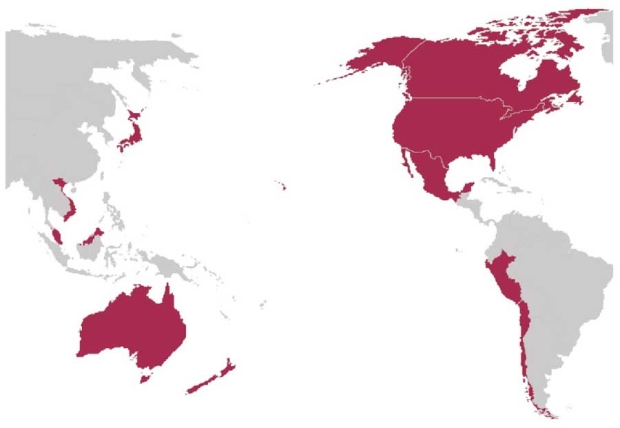
by Mark Powers, Executive Vice President of the Northwest Horticultural Council.
The White House announced the conclusion of negotiations on the Trans-Pacific Partnership (TPP) trade agreement on October 5.
In addition to the United States, the Trans-Pacific Partnership includes Australia, Brunei Darussalam, Canada, Chile, Japan, Malaysia, Mexico, New Zealand, Peru, Singapore, and Vietnam. These 12 countries represent 40 percent of the global economy.
The average yearly sales of apples, pears, and cherries from our region to the 490 million people living in TPP countries other than the United States are over $600 million.
Now that negotiations have concluded, the national debate to determine if the agreement should go into effect has begun. More information will continue to be released over time, but already we have some idea of the benefits TPP will provide the tree fruit industry.
Eliminating tariff rates (a form of taxation) on tree fruit is a trade policy objective of the Northwest Horticultural Council. TPP furthers this objective by eliminating tariffs in Japan, Malaysia, and Vietnam.
According to information from the U.S. Department of Agriculture, Japan’s 8.5 percent tariff on cherries will be reduced by half when the agreement enters into effect, with the remaining tariff eliminated over six years.
Its 17 percent apple tariff will be cut by 25 percent immediately and the remainder eliminated in 11 years.
Japan’s 4.8 percent tariff on pears will be eliminated immediately when the agreement enters into effect.
Malaysia’s 5 percent tariff on apples, pears, and cherries will be eliminated immediately upon implementation of the agreement, and Vietnam’s 10 percent tariff on our tree fruit products will be eliminated over a three-year timeframe.

In addition to the United States, the Trans-Pacific Partnership includes Australia, Brunei Darussalam, Canada, Chile, Japan, Malaysia, Mexico, New Zealand, Peru, Singapore, and Vietnam. (Jared Johnson/Good Fruit Grower illustration)
In the eight other countries tariff rates are already at zero, either as a result of previous free trade agreements (i.e., Australia, Canada, Chile, Mexico, Peru, and Singapore) or, as in the case of Brunei Darussalam and New Zealand, the applied tariff levels are at zero and will be frozen at that level.
Every country that grows commercial tree fruit is aware of the market potential that exists in Asia.
This agreement will help us compete with producers in other countries by eliminating the duty-free preferential advantage producers in Australia and New Zealand have to Malaysia and Vietnam, due to the ASEAN-Australia-New Zealand Free Trade Agreement.
TPP also provides protection against future agreements, such as the ones the European Union is close to finalizing with Japan, Malaysia, and Vietnam.
In addition, the People’s Republic of China is leading an effort to negotiate the Regional Comprehensive Economic Partnership (RCEP), a trade agreement in Asia that is China’s counterweight to TPP.
All of these agreements disadvantage our growers and packers.
While it may not sound like much, a 5 or 10 percent tax, which is applied on the delivered cost of our fruit, and not on our competitor’s fruit, is significant and can result in importers not buying from firms in the United States or negotiating a lower price.
TPP will eliminate this competitive disadvantage.
On the United States’ import side of the TPP trade ledger, there should be no noticeable change in the level of apple, pear, and cherry imports attributable to the agreement. Why? Because U.S. deciduous tree fruit growers are not protected by tariffs.
The U.S. tariff rate on imported apples and cherries—for all countries in the world—is already at zero.
The 0.3 cent per kilogram tariff on imported fresh pears (applied eight months of the year from August through March) is equivalent to a paltry 0.2 percent tax, and eliminating it under TPP will yield little commercial benefit to competitors.
In addition to tariff elimination, the rules detail in 30 distinct chapters how trade among TPP member states is to be conducted and disputes settled.
Many of the chapters, such as those covering textiles and apparel, investment, cross-border trade in services, and telecommunications, have no direct impact on our industry’s business.
Other chapters, including those governing customs administration and trade facilitation, sanitary and phytosanitary (SPS) measures, technical barriers to trade, trade remedies, and regulatory coherence, will to varying degree impact the business and regulatory environment under which fruit sales are made and goods clear international borders.
U.S. negotiators explain that our country will not need to change its laws, but other countries will in order to comply with TPP. The strategic view is that we are exporting our rules-based and open way of doing business.
A reasonable question on rules involves the chapter addressing sanitary and phytosanitary measures.
While we currently have good market access to most countries involved in this agreement, there are some notable exceptions.
For example, we are currently unable to ship apples and pears to Australia, cherries to Chile, or pears to Japan.
Technically, we can ship apples to Japan but have not done so since 2000 due to that country’s phytosanitary restrictions regarding codling moth, which require the fruit to undergo a 55-day cold treatment and be fumigated with methyl bromide prior to shipment.
In the Trans-Pacific Partnership, phytosanitary barriers like those described above will be subject to scrutiny under rules that exceed the SPS Measures of the World Trade Organization.
Some provisions of the SPS chapter are novel and should be helpful in promoting consultation and dispute resolution between trading partners.
Yet, governments are quick to point out that regulators in every country will continue to be able to protect food safety and plant and animal health.
It remains to be seen what additional benefit these rules will provide in practice to remove the barriers mentioned above.
Finally, TPP is a “living” agreement that is viewed as a “platform” onto which additional countries can join in the future.
Taiwan, Thailand, and the Philippines are possibilities, and all three would present opportunities to our export interests given the tariff rates (up to 40 percent) that exist in those countries.
When the agreement is released to the public and the details become known, political decisions will be made to support or oppose the Trans-Pacific Partnership.
Given the information available today, it appears that the commercial interests of our apple, pear, and cherry growers and packers will benefit from the Trans-Pacific Partnership.
Note: At press time, the Trans-Pacific Partnership trade agreement was undergoing final review and translation and full details had not yet been made public. •






It may benefit you but you are obviously willing to trade America’s sovereignty for a five or ten percent tariff reduction. Other countries would be forced to accept GMO products and fruits spayed with Monsanto pesticides or be sued in the next century under the ISDS Clause. In return we have to remove some of our food saftey and food labeling laws which Congress already repealed after we were sued by Canada. Congress repealed the country of origin labeling so Americans no longer have a right to know where their meat is coming from. But I guess as long as it helps your bottom line profit that’s all you care about.
What a misleading report, first off competition goes two ways with these trade agreements and when your competing with countries like Malaysia who still uses slave labor or Vietnam who’s wages average 56 cents an hour, they can easily under cut US prices, also it would encourage big global investors to extort these impoverished areas even more while sucking the jobs and capital from our country. And second with these trade agreements we get the ISDS (investor state dispute settlement) which allows these agreements to bypass our judiciary and regulatory system or accept a huge penalty for the loss of profits that a business could have made had it not been for our laws or safety regulations. We have recently seen the affects of ISDS with an existing trade agreement that disallows labeling our meat of it’s origin but our illustrious leaders fixed all that to keep us from paying those big fines because the American people don’t need to know where their meat is coming from (I don’t know about you but if Vietnam wants to grow their fruits and vegetables in their human manure I don’t think I should have to unknowingly have to eat it)
hello
good day to everyone
my name is erwin
i have a land in north sumatera, indonesia
80 hectares width with freehold title
Height 250-300 meters above sea level
70% is hills
i am here to offer fruit planting cooperation
together we grow fruit and supply the needs of society
if you are interested
please do not hesitate to contact me
erwin sujoko
+6282125001113
+628192025445 (whatsapp)
ns_edwards@yahoo.com
thank you